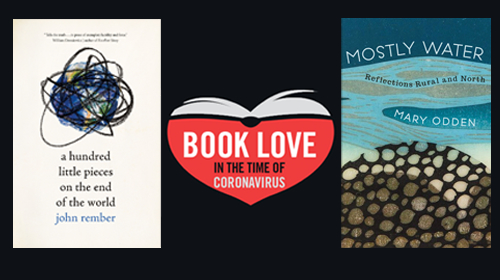Book Love in the Time of Coronavirus: Two Essay Collections

When fear comes to town and our leaders urge us to hole up and prepare for the worst, you can expect to experience periods of melancholy and disillusionment. Not for nothing are these called the times that try our souls. Even so, let’s make the best of the occasion by reading a book worthy of the moment; something that meets your contemplativeness head on and takes you even deeper.
You can’t do better than essays for the way they engage with you, look you in the eye, challenge your beliefs. An essay can make you feel inadequate; it might shove disagreeable ideas in your face and piss you off. It can teach you mind-altering things about yourself, the natural world, or offer a view on morality not influenced by religion. At best, the thoughtful ruminations of a wise essayist invite intense, soul-baring introspection.
John Rember’s A Hundred Little Pieces on the End of the World is a savage attack on complacency and idleness. If you want to be grabbed by the collar and told to pay attention, be better, think harder, Rember’s the guy for you. In a piece on teaching writing to self-satisfied college kids who thought they knew good writing, who were apoplectic when he returned their papers with Ds and Fs, he says, “most of my students … defended their stories as though they were defending human existence itself. That’s the trouble with narcissism: start seeing the world as an extension of yourself, and the world becomes fragile, temporary, wounded by your wounds, and ended by your physical or philosophical death.”
Rember is mirthful in his dark view on humanity. He exudes warmth and understanding even as he eviscerates how we mistreat the planet, each other, our limitless potential … if only.
The author of several books and short story collections, Rember lives in the Sawtooth Valley of Idaho.
Another extraordinary project is Mostly Water: Reflections Rural and North by Mary Odden, an Alaskan essayist and nature writer whose work has appeared in Northwest Review, Alaska Quarterly Review, the Georgia Review, and other journals. The ten essays—and detailed recipes for staples like mincemeat, creamed salmon, and lingonberry sauce—in Mostly Water showcase Odden’s deep familiarity with the Northwestern landscape, rural lifestyle, and brutal realities. Yet she is most on the alert for beauty: “The sound of a meadowlark, for those who have not heard it, is like whistled lace. It is sweet and sour and piquant on the tongue. Each time I hear one is like the first time I heard human voices in harmony—the joy of it so in the moment that it made a physical hurt in my chest.”
Call this a memoir if you like, but we prefer nature writing, and Odden does it at the highest level—best served with her pumpkin pie (recipe included).
Matt Sutherland
